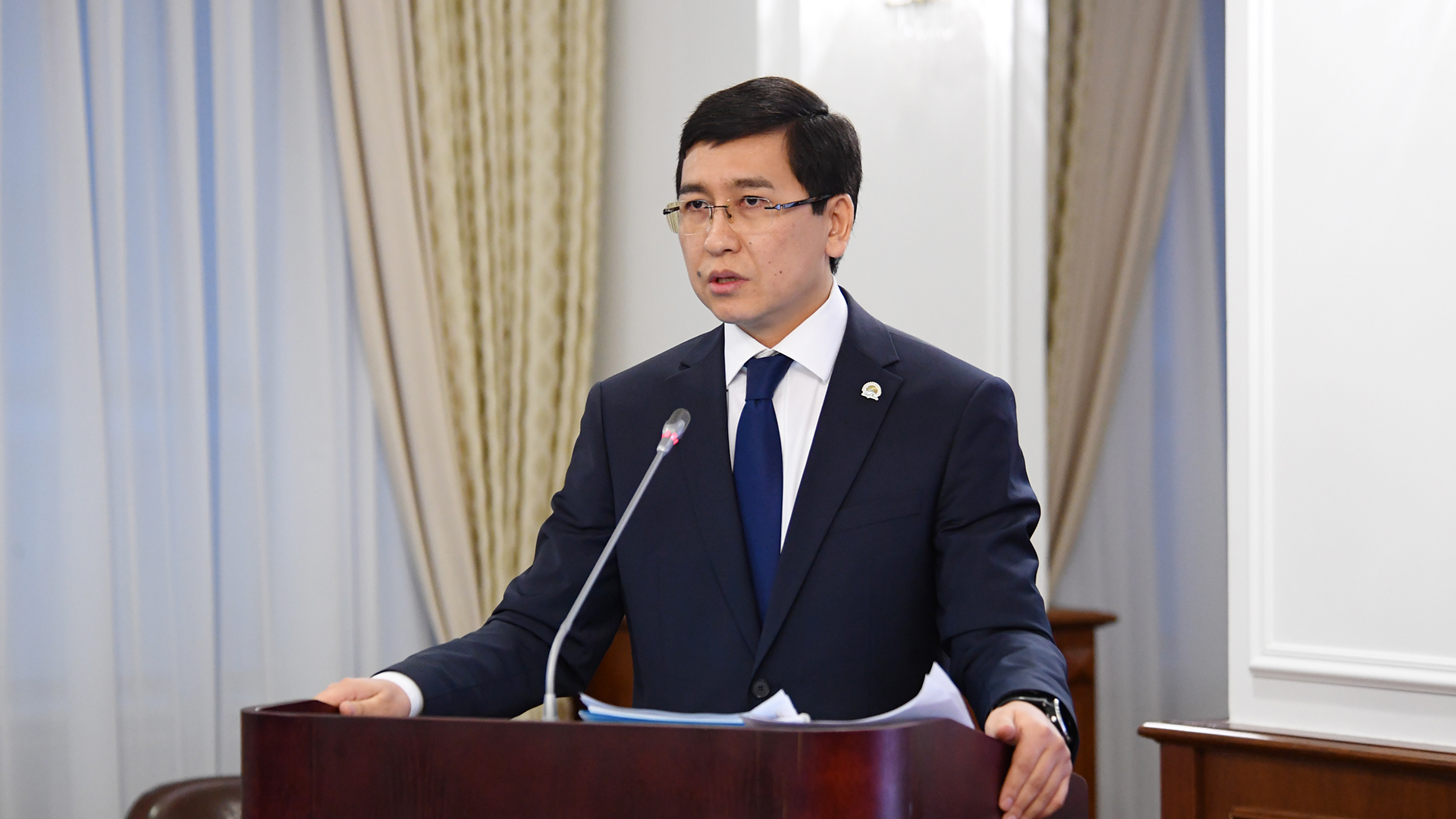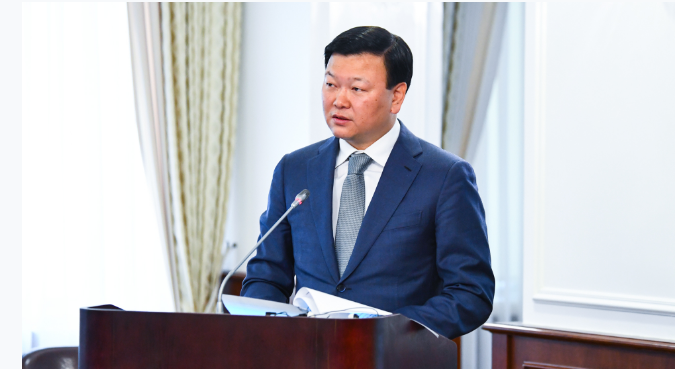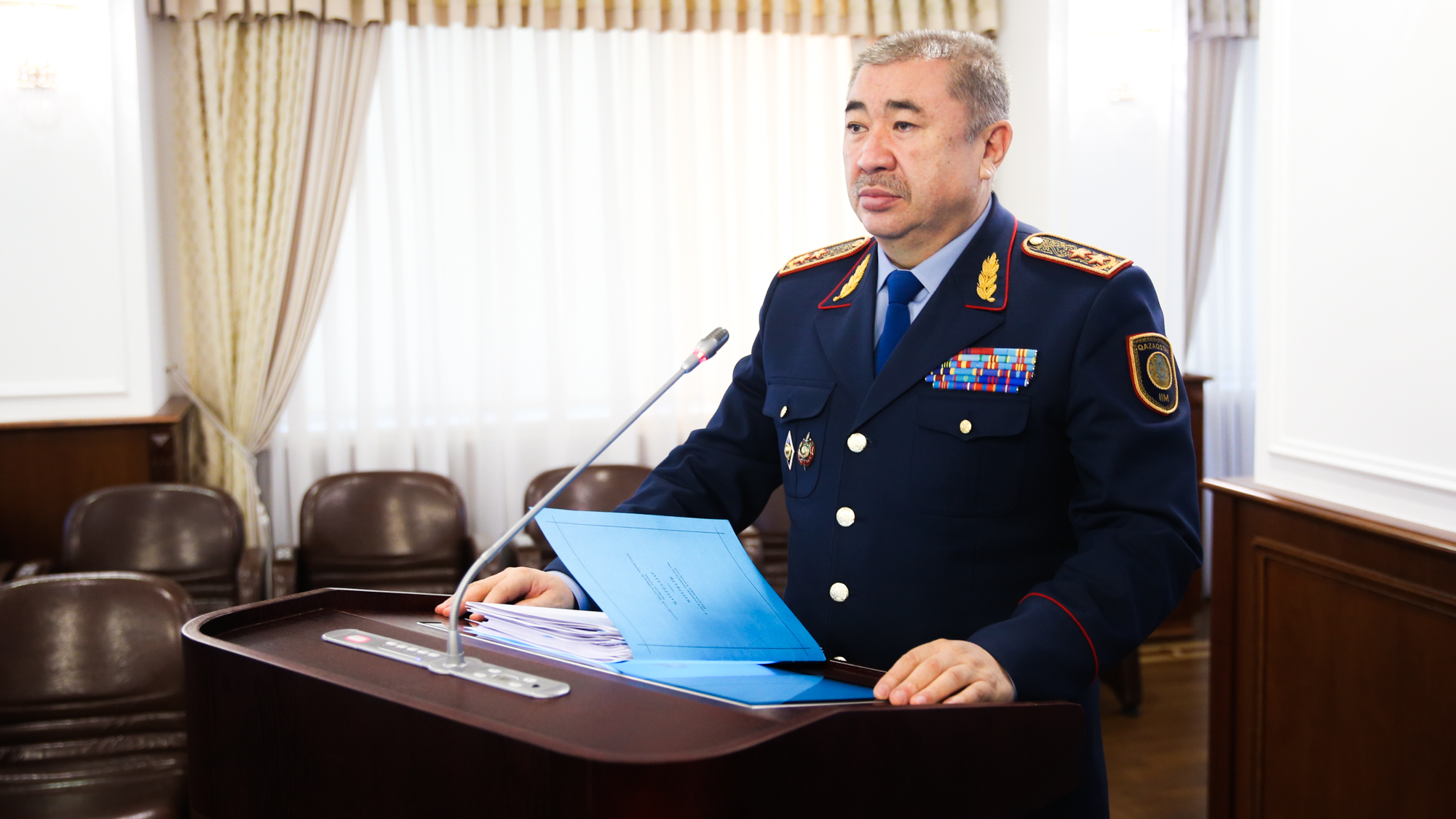01 June 2021, 13:37

At the government session chaired by the Prime Minister Askar Mamin, Minister of Education and Science Askhat Aimagambetov, Minister of Healthcare Alexey Tsoy, Minister of Internal Affairs Yerlan Turgumbayev and the UNICEF Representative in Kazakhstan Arthur van Diesen presented their reports on measures to protect the rights and ensure the safety of children.
According to the Minister of Education and Science Askhat Aimagambetov, 22 normative legal acts (in 2020), 83 legislative norms (in 2019-2020) have been adopted in Kazakhstan on behalf of the Head of State in the field of protecting the rights of children.
The realization of children's rights in the republic is ensured by a system of state guarantees.
At the regional and republican levels, effective interaction has been built with 9 central and 245 local government bodies, with more than 1,000 organizations.
“Interaction with public organizations is widely developed within the framework of consultative and advisory bodies: public and expert councils, children's representations, councils of fathers. The ministry works with 132 non-governmental organizations,” Aimagambetov said.
The ministry is a working body of the Interdepartmental Commission on Minors' Affairs and Protection of Their Rights under the Government of the Republic of Kazakhstan.
The issues of protecting the rights of children are resolved through the departments for the protection of children's rights and the guardianship and guardianship authorities.
During his speech, Askhat Aimagambetov dwelled on the main directions of the ministry's activities.
First. Legislative activity.
83 amendments made to the national legislation in 2 years allowed to ensure the improvement of state measures to protect the rights and interests of the family and the child.
As a matter of priority, measures have been taken to ensure the safety of children.
In 2020 alone, 22 legal acts in the field of childhood were adopted (2 laws, 1 order of the PM, 5 government decrees, 14 orders of the minister).
Second. Special attention is paid to the issues of ensuring the rights of orphans and children left without parental care.
Today, there are 23,063 orphans and children left without parental care in the republic, 18,805 or 81.5% are in families.
As Aimagambetov noted, over the past 10 years, the number of orphanages in the republic has decreased by 2 times (in 10 years — by 114, in 3 years - by 42).
There is also a 3-fold reduction in the number of orphanages. So, at present there are more than 4,000 inmates in 96 organizations for orphans.
For this, the following measures were taken:
18 orphanages were transformed into Child Support Centers.
Third. Development of inclusive education.
Conditions for children with special needs are being created in the country.
Since 2010, systematic work has been carried out to develop inclusive education, the fundamental principle of which is the right of a child with special educational needs to study together in a general educational environment with healthy peers, provided that appropriate conditions are created.
The number of children with special educational needs of school age is 110,818, of which 83,916 (75.7%) are enrolled in education.
“Thanks to the introduction of a per capita financing mechanism, funding for a child with a general education school will increase from this year, which will amount to about 400 thousand tenge. This change will also allow to cover the largest number of children with special educational needs with inclusive education,” Aimagambetov said.
A significant change in 2020 was the introduction into the Model staff of education workers of the Republic of Kazakhstan at all levels of education of a unit of assistant-teacher, designed to provide pedagogical support for a child with special educational needs in the general educational process.
As for the issue of ensuring the safety of children, the Minister of Education said that 100% of kindergartens and schools are provided with video surveillance. However, 21% of them do not meet the requirements.
Fourth. Ensuring the safety of children.
A significant place in the work of the Ministry of Education and Science is occupied by issues of prevention of emergencies in educational organizations, which, regardless of their form of ownership, are 100% equipped with video surveillance systems.
Thus, in the country, 823 (11.4%) schools are connected to the operational control center of the police.
466 schools (6.4%) signed contracts with security companies, 1076 schools (14.9%) have centralized monitoring consoles connected to alarm buttons, 333 schools have turnstiles.
The work continues in the framework of the standards and requirements for equipping kindergartens and schools with video surveillance systems and regional digitalization roadmaps adopted jointly with the Ministry of Internal Affairs of the Republic of Kazakhstan.
Also, the safety of students is ensured by 2,789 local juvenile affairs inspectors.
“Security issues include the problem of equipping schools with warm toilets. Today this figure has reached 98.9% (7,109 schools) of their total number of schools. The schools in 15 regions are 100% provided with warm toilets. We and the regions have been tasked with completely solving the problem by Sep. 1, and we are solving it,” added the minister.
Fifth. Organization of transportation of schoolchildren to the place of study.
In the republic, 16 thousand schoolchildren live in 1,051 settlements where there are no schools, and need transportation to their place of study. The vehicle fleet, consisting of 758 buses, is being updated: over 3 years, the local government agency purchased 203 buses.
Sixth. Organization of school meals.
Video surveillance is installed in school catering units. This year, their number exceeded 2400. By 2025, it is planned to provide 100% video surveillance coverage in these zones.
Also, at present, 248 schools in Kazakhstan have already switched to a non-cash payment format.
Among the measures for the implementation of these tasks, the following can be noted:
Competition procedures are carried out only in electronic format through a single portal of the Ministry of Defense of the Ministry of Finance (including colleges, organizations of additional education);
A complete ban on participation in competitions of unscrupulous suppliers of services, goods;
Strengthening of public control and activities of marriage commissions; phased transition to cashless payments.
Seventh. Support for children's initiatives.
“We support school initiatives. For this, 4 large projects have been developed. This is school self-government when school parliaments are created. This will give children the opportunity to develop leadership skills and social proactivity. The second project is the reading school. All libraries will work in a new format, all of them will be provided with fiction in the state language. The next ones are debate and volunteer movements,” explained the Minister of Education and Science.
The coverage of the debate movement is 49,706 schoolchildren, 9,768 college students, 6,712 university students. A Telegram channel has been created to help participants in the debate movement. Also, 35 training webinars were held.
The coverage of the volunteer movement is over 50 thousand children and youth. In this direction, it is planned to develop the movement in rural areas, implement the summer project Myn Zhasa, the participation of children in good-natured clubs.
Eighth. Additional education.
At the beginning of this year, additional education covers 62.8% or 2,185,958 children.
In order to develop accessible and effective mechanisms for improving the health of the population, an additional payment for extracurricular sports activities was established in the amount of 100% of the base official salary. This will allow to cover more than 520 thousand schoolchildren with sports sections.
State sports and state creative orders have been introduced.
These measures will allow one free circle or section to cover each student.
To implement this, the following measures are envisaged:
In pursuance of the instructions of the Head of State and Government:
- An index of the well-being of children is being developed;
- Measures are being taken to accede to the Optional Protocol to the Convention on the Rights of the Child on a communications procedure;
- A methodology for the children's budget is being developed;
- The work of psychological services is being strengthened.

In Kazakhstan, there is a positive trend in demographic indicators. This was announced by the Minister of Healthcare Alexey Tsoy.
“So, 2020 is characterized by a sharp rise in the birth rate by 4.7%, a similar peak was noted for the last time in 1987,” the minister noted.
Against the background of a high birth rate, despite the threats in the context of a pandemic and overloading the health care system, the infant mortality rate was reduced by 7.1%. The infant mortality rate decreased by 12.1%.
To improve the health status of children, as well as reduce infant mortality, the following systemic measures are being implemented.
First. For the timely detection of diseases and developmental disorders, 4.4 million children were covered by preventive examinations; screenings — more than 900 thousand young children. For the purpose of prevention, immunization covers up to 90.7% of the child population against 12 infectious vaccine-preventable diseases.
523 child development rooms were organized to advise on the issues of caring for young children. Free drug provision in 2020 covered 877,869 children with 96 diseases for a total amount of 24 billion 787 million tenge.
On the recommendation of UNICEF to support breastfeeding, 33 medical organizations have been awarded the status of "Baby-friendly hospital”.
85.6% coverage of children with exclusive breastfeeding was achieved.
To protect the health of children in schools in 2017, more than 6 thousand medical points were accepted from the education system.
Funding for school medicine increased 2.6 times. Within the framework of the compulsory health insurance, since 2019, an additional per capita standard for a student has been introduced, which has now been increased by 1.7 times.
The equipment of medical offices has improved from 52% in 2017 to 70% in 2020. During this period, the number of doctors increased by 16%. 367 school dental offices were opened for comprehensive examination, prevention and treatment.
Second. Thanks to the implementation of effective perinatal technologies recommended by WHO, modern methods of resuscitation, the survival rate of premature babies has increased to 80%.
The introduction of innovations in specialized services has contributed to the improvement of children's health. Neonatal surgery is developing, more than 1,000 surgical interventions are performed annually on newborns with congenital malformations, the effectiveness of which was 88.5%.
Over 2,000 cardiac surgeries per year are performed on children with congenital heart defects, of which 77.0% were children in the first year of life, previously this category of children was sent only abroad. The efficiency of open heart surgery was 95.0%, and that of endovascular interventions was 99.5%.
The development of oncological and hematological care is of great importance. The use of new methods of diagnosis and treatment, chemotherapy has improved the quality of life and increased overall survival of children with cancer.
Since 2012, 245 hematopoietic stem cell transplants have been performed, while the efficiency was 68.8%, and the survival rate after transplantation was 65.8%, which is a good result compared to world data.
Third. The ministry, together with scientific, republican centers, carries out daily monitoring of children in critical condition with the organization of consultations on telemedicine, visits of republican specialists, transportation through sanitary aviation, transfer to republican centers.
So, in 2020, there were 17,131 critical cases among children, of which 10,642 were newborns. 1,746 remote consultations were carried out by republican experts.
To 984 children, 571 ambulance flights were made with the provision of 1,194 medical services, of which 857 were transported.
Over 7 thousand children with COVID-19 received medical assistance in 2020, 134 of whom are newborns.
‘’For coordination and monitoring, a working group of experts from specialists from republican organizations and universities was created, which held 105 consultations for 91 children with the most severe forms, 45 children were diagnosed with Multi-Inflammatory (Kawasaki-like) Syndrome (MVS). The adoption of comprehensive measures (development of a clinical protocol, guidelines, training, consultations) made it possible to avoid high mortality from MVS,’’ noted Tsoy.
Fourth. In order to protect the rights of children with disabilities, a children's rehabilitation service is being developed. There are 34 rehabilitation centers in the country, 3 of which are at the republican level. At the initiative of the Fund of the First President of the Republic of Kazakhstan, 8 rehabilitation centers were opened within the framework of the Kamkorlyk Roadmap. This work continues in 2021, it is planned to build 10 rehabilitation centers.
“Within the framework of the implementation of the compulsory health insurance, the financing of children's rehabilitation has almost doubled in one year. This made it possible to expand the bed capacity by 45.6%, which improved the availability of rehabilitation treatment and medical rehabilitation services by 22%,” said Alexey Tsoy.
Fifth. When solving many problematic issues of the children's service, the Ministry of Health closely cooperates with other government agencies, departments, as well as public and patient organizations, charitable foundations.
Patient communities facilitate interaction with the community, especially when working with children with cancer, orphan and other complex diseases.
The social and preventive orientation of the pediatric service with emphasis on disease prevention, early diagnosis and intervention should become a new paradigm in the child health care system. This will make it possible to achieve an improvement in neonatal indicators, a decrease in morbidity and mortality in children.
According to the WHO, investment in early childhood development is considered the most effective and cost-effective intervention, and it is estimated that a 17-fold return on investment in this period can be expected.
In this regard, it is necessary to make efforts to further improve the prevention and diagnosis systems, to develop modern import-substituting technologies by strengthening primary and specialized services. In this regard, it is necessary to create centers for early intervention, follow-up and orphan diseases.
“The work of the health care system for the benefit and health of children will continue,” he concluded.

Minister of Internal Affairs Yerlan Turgumbayev in his speech focused on the issue of ensuring safety in schools.
According to him, the Ministry of Internal Affairs, together with interested government agencies, is consistently working to ensure the protection of the rights of minors.
Measures have also been taken to improve legislation. Such types of crimes as rape and violent acts of a sexual nature have been transferred to the category of serious crimes, thereby excluding the possibility of reconciliation of the parties.
In general, as a result of the measures taken over the past 5 years, the number of crimes against minors has decreased by 30%.
To improve the organization of crime prevention, primarily in the family and household sphere, the number of inspectors for juvenile affairs and units for the protection of women from violence has been increased.
From now on, such positions are available in every city district police department.
At the same time, as a result of neglect last year, 108 children fell out of the windows, 18 died.
To improve the situation, an integrated approach and the participation of all interested bodies and the public are needed, the head of the Ministry of Internal Affairs said.
Currently, the internal affairs bodies, together with the education authorities, are conducting a full monitoring of schools for staffing with security systems, which showed that:
Along with this, in order to strengthen security measures at the beginning of May this year. The government approved new requirements for anti-terrorist protection for UTO facilities (PP dated 06.05.2021, No. 305).
“The Ministry of Internal Affairs, together with the Ministry of Education, has developed a List of Prohibited Items in Educational Organizations. This has not happened before. Such items include weapons, knives, brass knuckles, simulated explosive devices, spray paints, pyrotechnics and gas canisters. The order is currently being signed at the Ministry of Justice,” Yerlan Turgumbayev said.
In addition, additional qualification requirements are introduced for private security organizations that ensure the safety of schools.
As the head of the Ministry of Internal Affairs of the Republic of Kazakhstan noted, in order to effectively protect the rights of minors it is proposed:
First. Local executive bodies, as soon as possible, provide educational organizations with the appropriate security systems (security, video surveillance with output to the central control center, panic buttons, turnstiles, alarms, security controls).
Second. Ensure the safety of schools and kindergartens with licensed private security organizations.
Third. Taking into account the analysis of the actions of teachers and children of the school in Kazan, it is required by the Ministries of Education and Science, Emergencies and Internal Affairs to organize special training of students and personnel for actions in case of emergencies of a man-made, natural character and crisis situations (fires, earthquakes, floods, terrorist attacks , attacks, hostage-taking, etc.).
Fourth. To intensify the work of school psychologists to identify students prone to violence, to provide them with psychological assistance. Provide measures to prevent bullying among adolescents.
Fifth. Expand the practice of providing organized transportation for schoolchildren.
Sixth. Organize the availability of sports sections and clubs for children during the summer holidays.
Seventh. Strengthen security measures during collective trips of students to recreation sites and in children's health camps in order to prevent accidents.
Stay updated about the events of the Prime Minister and the Government of Kazakhstan - subscribe to the official Telegram channel
Subscribe